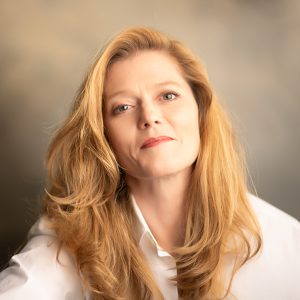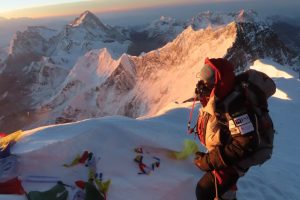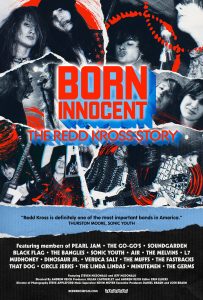‘I love it when things get out of hand’: the return of outrageous 90s rockers the Jesus Lizard | Music
Sweaty, unhinged and with one of them frequently naked, few underground rock bands remain as revered as the Jesus Lizard. The US band’s early 90s albums Goat and Liar inspired awe in American alt-rock royalty such as Kurt Cobain, Steve Albini and Henry Rollins, and the band’s live sets cemented their status: guitarist Duane Denison, bassist David Wm Sims and drummer Mac McNeilly locked into near-ritualistic rock’n’roll while frontman David Yow, his genitals flapping, careened into the audience, surfacing like a pink dolphin fighting against a net of hairy arms and plaid shirts.
Hatched in Texas before relocating to Chicago, the band’s initial run lasted from 1987 to 1999. Since 2008 they have periodically reconvened for live “re-enactments” (Yow’s term), but their new album, Rack, is their first fresh music in 26 years: a tense, teeth-bared sewer rat of a record. “We had to be brutal and blunt with our assessment every step of the way so nothing came off flat or dull,” says Denison – dapper, charming, occasionally distracted by the whims of his cat – from his Nashville home. “I checked out other people’s old-guy reunion albums and made mental notes about what was good and what wasn’t. One thing I noticed is that they seem overly mature: really trying to show how wise they are and how they’ve grown. But that’s not fun. We want mindless mayhem along with an element of sophistication – that was always our thing.”
Indeed, the band have long combined the primal, horny honk of Led Zeppelin with elements of post-punk and minimalist composition; on those 90s classics Yow is utterly uninhibited, delivering caterwauled character studies and the breathy obscenities of a late-night crank caller. “To me, David’s voice was almost like a free jazz saxophone,” says Denison. “There was always the dichotomy between being this very organised working unit and the more free-range kind of thing.”
Like the band itself, Yow’s lyrics were weird, threatening and darkly comedic. Some, such as those featuring amputees or glum pygmies, were pure flights of fantasy, while others immortalised real-life figures such as a scumbag landlord or the drug-addled festivalgoer who once stole Sims’ clothes. The band’s gigs were equally unpredictable, with a naked Yow delivering parlour tricks involving his scrotum before vanishing into the crowd for multiple songs at a time.
“I love it when things get out of hand,” Yow admits. Speaking from his home in LA – his day job is retouching movie posters, with a sideline acting in films by the likes of Macon Blair and David Robert Mitchell – he’s almost the antithesis of his stage persona: quiet, thoughtful and drily, subtly funny. “I like the chaos and the confrontation, but it’s not testosterone-driven and it’s not malevolent,” he says. “It’s just fun to get right in people’s faces.”
His bandmates would try to keep out of his orbit and ensure the mayhem was somewhat contained. “He’d get hurt so often that our rule was we’d finish the song before we checked up on him,” says Denison. “More often than not he’d get up when we’d pour beer on him, though a couple times he didn’t.” Yow is matter-of-fact about the injuries he sustained, no matter how grievous. “I’ve been hospitalised several times,” he says. “I think the worst time was in Zurich. I jumped into the audience and they just sort of parted, so I hit the cement floor. They picked me up and dumped me back on stage and I was like a rag-doll – I’ve seen the video and it nearly made me puke. David Sims said he only quit playing when he noticed that my eyes were open but I wasn’t moving and that the puddle of blood under my head was getting bigger.”
We are talking the day before the singer’s 64th birthday, and while he is well aware of the toll the years have taken – he’s been working with a personal trainer to build strength and endurance in advance of the gigs the band have booked – he maintains that being part of the crowd is still part of the show. “It’s fun and I think it’s relatively entertaining,” he says wryly. “And, especially now that I’m pretty fucking old, supporting my own weight after a few songs gets difficult. If I jump out there I get to lay around.”
This knack for goading a reaction out of the audience predates the Jesus Lizard. “He was always theatrical in a weird way,” Denison says of seeing Yow perform in pre-Jesus Lizard act Scratch Acid. “Even when he wasn’t playing, he’d crash people’s gigs. Like when he went on stage with Butthole Surfers dressed as a redneck and broke a fake bottle over their singer’s head. It looked so real that people in the audience attacked him – someone broke his nose.”
Despite the bloodshed, insanity and temptations of life on the road, the Jesus Lizard were otherwise surprisingly sensible. They lived, toured and recorded frugally, the four of them sharing a three-bedroom house, driving their own tour buses and sleeping top-to-toe in cheap motels or on people’s floors. “I don’t think we ever lost money on tour,” says Denison. “Early on we never really made money, but we didn’t go broke. One year, I think 1990, my net income was $800. What did I live on?! If you look at photos from those days I just look skinny and insane.”
This self-sustaining lifestyle bonded the band like family, and beyond their DIY decision-making they also fostered relationships with people who could help them navigate the industry: entertainment attorney Elizabeth Gregory ensured the band were paid not to write a third album to see out their contract with Capitol Records.
For a band so legendarily unpredictable, the Jesus Lizard’s 1999 demise came with a whimper rather than a bang. “We just kind of fizzled out,” says Denison. “There was no feud, no fighting, no unresolved conflicts or legal problems. We just kind of said, ‘OK, it’s been a good run’ and shook hands.” But from Yow’s perspective, the wheels began to fall off as early as 1996 when drummer McNeilly left the band to spend more time with his family. McNeilly’s replacement, Jim Kimball, proved less than ideal. “I hate his guts,” says Yow bluntly. “He’s such a dipshit. The time we spent with him as a hired hand was drudgery. It was like a job.”
Post-Lizard, members immersed themselves in family life, worked as accountants and librarians, embarked on solo projects and collaborated with everyone from Mike Patton (Faith No More), Flipper and Hank Williams III. Denison played on Jack White’s Fear of the Dawn LP and alongside the likes of Ronnie Wood on Beverley Knight’s album Music City Soul. Yow had been hesitant to embark on the “re-enactments” that began in 2008: “When we got back together and toured, I loved every minute of it,” he says. “But I don’t think that I’d missed it … to me it seemed like fucking an old girlfriend”.
Concerted efforts were required to woo him back to record the new material that the band had been surreptitiously working on without him. “He was apprehensive about it,” says Denison. “So the rest of us said: ‘Let’s start working on stuff. Once the train starts to leave the station he’ll want to get on board.’ And that’s exactly how it worked out.”
While Yow seems laissez-faire about the band’s legacy or the role music plays in his life (“I love doing it, but it’s just not necessary for me the way it is for them – I wish I paid my bills through acting”), he is visibly excited when talking about new tracks such as Hide & Seek or Armistice Day: he describes the former as his favourite thing that Denison has ever done while raving about how “over-the-top” McNeilly’s drumming is on Grind.
Indeed, both men seem giddily energised by the music they are about to unleash. “It was definitely not like the old days,” says Denison of making new music together after so long. “But it seems like as soon as we start playing, things just happen – you find the parts fitting together. Obviously we’re older, wiser and more experienced, but in some ways I think we’re sounding better than before. Probably because we’re not getting wasted as much.”





